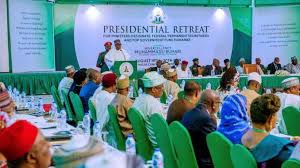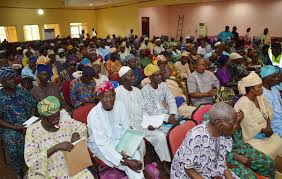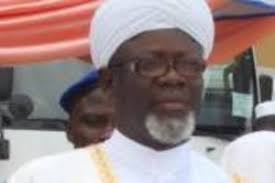Blog
The Hopes in Agriculture for a Better Economy
- By solomon2day
- On 09/12/2019
- Comments (0)
- In Solomon's Column
Agriculture has the potentials of been a major revenue earner in Nigeria, if only farmers had not been neglected for several years and deprived of needed incentives.
Indeed, farmers in rural areas have never been encouraged to remain within their localities to propel increased farm production, while production at the local government level has made the availability of schools,Primary health Care Delivery, functional electricity and potable water a mirage.
The caretaker committees at the grassroots have only succeeded in impoverishing the rural populace.
At present, agricultural equipment and machinery are sourced from advanced countries, this alone, is an impediment to self sufficiency in food production.
Indeed, sub-standard farm equipment and machinery to a large extent affected output in most farms in the country, just as access to finance is a major challenge for farmers. Bank interest rates are not friendly, if at all the banks are ready to give out loans to farmers. Although the Federal Government assures that it would fully support the agricultural sector, inadequate funding of the sector, closely trailed by diversion of funds meant for agricultural production is still common place.
The erratic power supply, prohibitive cost of petroleum products and the activities of insurgents, bandits and kidnappers have all contributed to make the agricultural sector less attractive.
Truly, government monopoly in critical sectors is an advantage, but bad management as a result of corruption is the idiscussion on every motuh in the land.
At Nigeria’s level of development government ought to invest alongside private individuals. But waiting for the agricultural sector to blaze the trail, is a sign of lack of vision. It is only when the country has reached full employment level, that government can think of divesting.
Has Nigeria reached the level of full employment ? This might not be so, as the National Bureua of Statistics is very reluctant to make public the rate of unemployment in the country, even though the answer could be seen on the faces of millions of jobless Nigerians.
Without doubt, the agricultural sector can provide millions of jobs, once the leadership appreciates what is required to transform the economy.
But good management revolving round a porous judicial system and law enforcement agencies are never the panacea for sustainable development and growth.
The Search for Exemplary Leaders in Nigeria Continues
- By solomon2day
- On 02/12/2019
- Comments (0)
- In Solomon's Column
The present administration in Nigeria insists that it to anchors its policies on transparency, integrity and honesty.
For several years successive administrations in the country have failed to incorporate the aforementioned in the national life.
Rather, activities and actions have been channeled towards stagnancy, retardation and underdevelopment.
At the inauguration of boards and parastatals in Oyo state, on 24 June, 1999, the then Governor of Oyo state, Alhaji Lam Adesina, of blessed memory, stated : ”We took our time in ensuring that men and women of integrity and probity are chosen among innumerably qualified men and women. We don’t like to be proved wrong and this is why we implore you to rise up to the challenge and improve the lot in your work place.''
”We are very serious when we promised our people that probity and public accountability will be our watch word, most of the areas, you have been posted to, are afflicted and already grounded by financial impropriety and squandermania. We, as an administration have made covenant, with our people and we shall not renege on it”, Alhaji Adesina concluded.
Indeed, Nigerians are still wondering, if the present crop of political appointees at both the Federal and State levels would make probity and public accountability their watch word, considering the rot in the system. Interestingly, the appointees are yet to publicly declare their assets.
In 2009, the Day Star Christian Centre organized a conference, ”Excellence in Leadership”. In attendance, was the then Governor of Lagos state, Babatunde Fashola, who is now the Minister of Works and Housing.
Fashola had emphasized the need for Nigerians to embrace the basic values of good conduct.
”By sowing for an early crop, the capacity to ‘lead’ particularly in our youths, we can guarantee this nation, a harvest of exemplary leaders that our people so dearly expect and indeed deserve”.
Without doubt, the country is in dire need of principled and visionary leaders. However, the absence of people with good leadership qualities has for long served as a major impediment towards achieving developmental goals.
But the existence of principled and visionary leaders, seems to be a mirage, when confronted with the fact that most power brokers end up managing wayward children.
In the political scene, the Father continues to contend with issues of governance, while the Mother runs around to boost the fortunes of her pet project.
At the end of it all, the children grow up without parental care, with their behaviour, similar to that of their Nannies and Teachers.
The ”World is yours” becomes their creed, while the state and its resources are at their beck and call. Indeed, transparency, integrity and honesty is not yet within reachable distance.
I am not in support of Hate Speech but........-Vice President (South)Association of Eze ndigbo-in-Diaspora
- By solomon2day
- On 26/11/2019
- Comments (0)
- In News
The hate speech bill currently in the National Assembly which recommends death penalty for those found culpable is a sign of leadership failure in the eyes of millions of Nigerians. The political class, government officials and the citizenry are culpable.
Indeed, hunger, poverty and unemployment are the lot of Nigerians today, even as the Federal, State and Local Governments feebly struggle to come to terms with the reality of the times.
In this interview, the Eze Ndigbo of Ibadan and Oyo state, who is also the Vice President(South) of the Association of Ezendigbo-in-Disapora, Eze(Dr.)Alex Anozie opines that once government at all levels addresses the major challenges confronting the country such as kidnappings, killings, banditry, corruption, hunger, poverty and unemployment, hate speech would be reduced to the barest minimum. Excerpts :
What is your reaction to the hate speech bill which recommends death penalty for offenders, presently before the National Assembly ?
Most times I wonder what is happening. What is the priority? Why go to that area of death penalty for hate speech? Considering all that is happening in the country. People are hungry, people are in pain. I am not in support of hate speech. It is dangerous and a threat to the unity of the country, but that is not the priority now.
The Federal Ministry of Information and the National Orientation Agency (NOA) should go ahead to campaign against hate speech.
But taking it to the level of death penalty, sounds strange. It was not there before, not to the alarming rate it is now. What and what is causing hate speech. We should be able to ask ourselves this question.
Is it not killings and the wanton destruction of lives and property, sufferings, hardships and religious hatred? All these are the causes of hate speech.
Corruption, lopsided appointments and lopsided development are also the causes of hate speech.
If all these challenges are addressed hate speech would fizzle out.
Government should continue to talk to the public about hate speech.
Government should also do things better. Government should ensure that the killings in every part of the country stops. The rate of crime is on the increase, it is crime here and there.
It is kidnapping, killing or militancy; we are not hearing good news anymore.
I am not in support of hate speech, but we should all work hard to know how it came about.
There is never a smoke without fire.
When marginalization is at play, there would be hate speech, when justice and equity are not in place there would be hate speech, when the people are hungry, a hungry man can open his mouth and say whatever he likes, if he has the strength.
Finally, I say it again nobody must support hate speech. Whatever we want to say out we should ensure it helps to build the nation, it ensures peace and tranquility. We have to identify the root causes of hate speech and remove them.
Politicians open their mouths to say whatever they like, in their desperation to pull each other down. This also constitutes hate speech. When people are hearing of how Billions of Naira are been stolen and stashed away in foreign countries, do you expect them to shut their mouths? All they say constitute hate speech.
Executive Bill on Taxes : President Buhari should consider Poor Nigerians by not Assenting -Pensioner
- By solomon2day
- On 26/11/2019
- Comments (0)
- In News
President Muhammadu Buhari has been called upon not to give his assent to the Financial bill recently passed by the Senate.
This call was made by the former National Vice President of the Nigeria Union of Pensioners(NUP), Alhaji Lateef Adegoke.
''President Muahammadu Buhari should not sign it. I advise that the increase should be reversed for the benefit of poor Nigerians. If 10 per cent out of 200 million Nigerians are better off financially, then the President should reconsider this and not sign the bill. Things are not okay for Nigerians, people are suffering, people are hungry, the President should consider the plight of poor Nigerians by not signing the bill'', Alhaji Adegoke advised.
The Other Side of Safeguarding the Lives and Property of Nigerians
- By solomon2day
- On 26/11/2019
- Comments (0)
- In Solomon's Column
Today's Teachers are in the Profession to Keep Body and Soul Together-Prof. Olagoke
- By solomon2day
- On 18/11/2019
- Comments (0)
- In The People Talk
Nigerians are unanimous in their clamor for the re-introduction of Teacher Training Colleges as part of the efforts to salvage the falling standard of education in the country from total collapse.
Indeed, a sizable number of teachers have overtime exhibited tendencies and behaviors not in line with the dictates of the noble profession, while pupils and students alike have emulated same.
In this interview, the Founder, Spiritual Head and Grand Imam of Shafaudeen-in-Islam Wordlwide, Prof. Sabitu Olagoke insists that present day teachers are in the noble profession for the purposes of survival not for the love of the profession. Excerpts :
Do you think the re-introduction of Teacher Training Colleges would play a significant role in salvaging the falling standard of education in Nigeria ?
The policy makers over the years in Nigeria have displayed a high level of over zealousness when it comes to adopting to adapt new trends in the areas of advancement in education.
They failed to look inwards, our cultural background and the needs of the society. The basic background that could be traced to 6–5–4 system of education, whereby the five years in the secondary school could be augmented with advanced level classes, before proceeding into the universities. This was far better mainly because it was effectively managed in terms of teachers and the facilities needed on ground. Some people may adduce this to the fewer number of schools and teachers as well as fewer population of students to cope with then.
The greatest advantages then, were the people’s appreciation of the value of education, the immediate opportunity for graduates to be absorbed from the labor market as well as the best discipline on offer as a necessary prerequisite that would enable seriousness in learning.
It was an era when boarding schools were facility laden with trustworthy house masters.
It was also a period when religious houses were sacred for the much needed vitamins of the fear of God for the teachers and the students.
However, with the advancement of education, it was good to discontinue the use of auxiliary teachers, most of whom were more matured and committed in the classrooms, than today’s graduates, most of whom are unhappy with the teaching profession, but for economic survival, take the teaching job to keep body and soul together.
The establishment of the Universal Primary Education(UPE) for which Teacher Training Colleges became popular, was a very good policy in the right direction.
The graduates were basically trained on the methodology of teaching in education, the preparation of lesson notes and the keeping of records in an environment of high level of discipline and respect for constituted authority with a high level of focus on building a happy home in which future leaders for the society in particular and nation as a whole must be brought up.
Graduates of the Teacher Training Colleges were fully committed to the profession and were always time conscious with respect to punctuality and regularity at work. They were always ready to be directed and managed by their Headmasters or Principals, whose instructions must be obeyed and who happened to be graduates of universities, most of whom took courses in education at the post graduate level, with Grade I and II qualifications in their kitty before acquiring university education.
Headmasters and Teachers were then role model parents who believed in working for government for good, holding tenaciously to the principles of transparency and accountability.
Government would have left this phase of our educational institutions when creating the Colleges of Education, rather than phasing it out.
They ought to have restricted the activities of graduates of Teacher Training Colleges to the grassroots level of Primary Schools, while those in Colleges of Education would have been trained for the Junior Secondary Schools in the 6–3–3–4 education system.
While graduates of universities and probably Polytechnics at the HND level all with technical bias towards specific vocations, with some knowledge in entrepreneurship studies would have been prepared to manage our Secondary schools. With this arrangement based on relevant disciplines and subjects, the instructional facet of all segments of our educational levels would have been appropriately captured and fixed. This is because graduates of each sector of our lines of educational development and structure have good opportunities of resorting to, based on their capacity and capability at the time, apprenticeship for artisan ship, vocation and entrepreneurship for possible self job creation ability and promotion of employment opportunities for others, to lessen the pressure on graduates hustle for white collar jobs.
The mistake made in the phasing out of the Teacher Training Colleges, is the present mistake that is about to be repeated in the case of the Technical Colleges, which would have served the nation if well funded and equipped in the following areas :
- Foundational step to engineering and other professional technical appreciation needs.
- It would have been a technical forum to train our artisans, who control our economy on the need for skill acquisition and proficiency needs. The class would have been for the development of initiative, innovation and creativity as and a center for talent discovery.
Generally, Nigeria’s policymakers, most especially in the areas of education, must always take cognizance of our background and our needs for our graduates to be relevant directly in the areas of community service, society development and nation building.
After all, all our professional bodies have family pyramid structure. For example, craftsmanship, technicians, technologists and corporate membership. All of them are yet to take care of sectors of artisan ship for proficiency needs while their fellow cadres are yet to be specifically saddled with serious assignments of mentor ship, research and development .
Suffice it now to say, that no segment of our educational system like the Teacher Training and Technical Colleges should be phased out or neglected because our developmental needs in Nigeria have not outgrown them.
The two sectors would have assisted us in bridging the gap between the needed strong foundation and the advanced stages of education and development.
In the area of affective education, happenings in our schools, Primary, Secondary and Universities are characterized by examination malpractices, sex-for-marks scandals, cultism, admission racketeering among others. All these portends that the goal of education regarding our attitudinal correction are yet to be effected.
Kleptocracy in governance equally reflects in the activities of these graduates, old or new, as an attestation that there is not no single impact of what they learned in their behavior.
In the area of cognitive education, there is a misplacement of priorities. For example, we have failed to run effectively our Polytechnic system as a result of a lack of facility update for research and development and the training need of students to be in tandem with the necessary industrial essence with what obtains in companies.
Nigerian graduates still need to undergo a lot of training before they can be certified fit for employment in industries.
Why is it that Nigeria is just realizing the need for technical universities ?
To what extent have our Schools and Universities of Agriculture served the nation in terms of poverty alleviation and eradication ?
Why is it that there is still limited spaces for successful candidates, who passed the UTME and post UTME in the educational institutions in the country ?
Recently, China retraced its steps, on the need to survive through the development of technical education and technological development, by converting 600 of its universities into polytechnics while Nigeria is on the verge of collapsing the HND certificate program.
Policy making must go beyond the rhetoric of politics because it is about the life of our people and the future of the nation.
Association of Eze Ndigbo in Diaspora visits Olubadan of Ibadanland
- By solomon2day
- On 08/11/2019
- Comments (0)
- In Pictures
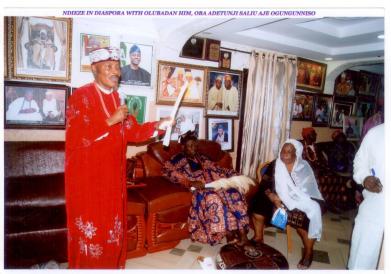 Eze Ndigbo of Ibadan and Oyo state and Vice President(Southern zone)Association of Eze Ndigbo in Diaspora, Eze(Dr.) Alex Anozie, addressing the Olubadan of Ibadanland, Oba Saliu Adetunji, Aje Ogungunniso 1, his Olori and members of the association
Eze Ndigbo of Ibadan and Oyo state and Vice President(Southern zone)Association of Eze Ndigbo in Diaspora, Eze(Dr.) Alex Anozie, addressing the Olubadan of Ibadanland, Oba Saliu Adetunji, Aje Ogungunniso 1, his Olori and members of the association
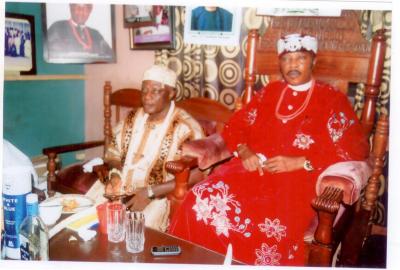

Ugandan Feminine Activist Jailed for 18 Months for Criticizing President
- By solomon2day
- On 07/11/2019
- Comments (0)
- In News
 Frontline feminine activist and university lecturer, Stella Nyanzi has bagged an 18 month jail term for criticising Ugnada's President Yoweri Museveni.
Frontline feminine activist and university lecturer, Stella Nyanzi has bagged an 18 month jail term for criticising Ugnada's President Yoweri Museveni.
Nyanzi had through a facebook post carpeted Museveni's 33 year rule.
In her reaction Director for East Africa, Amnesty International, Joan Nyanyuki said that “Stella Nyanzi has been criminalised solely for her creative flair of using metaphors and what may be considered insulting language to criticise President Museveni’s leadership''.
“The mere fact that forms of expression are considered insulting to a public figure is not sufficient ground to penalize anyone. Public officials, including those exercising the highest political authority, are legitimately subject to criticism and political opposition.”
“This verdict is outrageous and flies in the face of Uganda’s obligations to uphold the right to freedom of expression for all people in Uganda and demonstrates the depths of the government’s intolerance of criticism,”
“It must be quashed and Stella Nyanzi, who has already suffered enormously for expressing her opinions, left to get on with her life.
“The Ugandan authorities must scrap the Computer Misuse Act 2011 which has been used systematically to harass, intimidate and stifle government critics like Stella Nyanzi.”
Anyanzi was arrested and detained in prison on 2 November 2018, two weeks after she posted a birthday poem considered to be abusive against the President.
The acitivist has already spent 9 months in prison.
Governance at all Levels Ought to be all Inclusive-Eze(Dr.)Anozie
- By solomon2day
- On 07/11/2019
- Comments (0)
- In News
Government at all levels have been advised to ensure governance is anchored on the all inclusive principle.
The Ezendigbo of Ibadan and Oyo state Eze and the Vice President(Southern zone)Association of Ezendigbo in Diaspora(Dr.)Alez Anozie gave this advice in a chat with Federationews2day.
‘’When government at all levels is all inclusive, it will go a long way in uniting the country and it will also go a long way in making people to have confidence in the true unity of Nigeria’’, Eze(Dr.)Anozie asserted.
Similarly, a statement by Eze(Dr.)Anozie disclosed that the President of the Association of Ezendigbo in Diaspora, Eze Ibekwe called on Igbos in the 36 states and Abuja to be law abiding.
Eze Ibekwe, according to the statement, made this call in Ibadan, during the general meeting of all the recognized Ezendigbos residing outside the South East Geo-Political zone in Ibadan.
The statement further said that the Chief Host, Eze (Dr.) Anozie was earlier on hand to receive members of the association at his palace in Ososami, after which they proceeded on a courtesy visit to the Olubadan of Ibadanland’s palace.
It also said that both the executives and members of the association and the Olubadan gave assurances of mutual cooperation and peaceful co existence among the two tribal groups.
The Community must be Sensitive to the Lifestyles of Landlords and Tenants-Prof. Olagoke
- By solomon2day
- On 28/10/2019
- Comments (0)
- In Special Report
Residents of several communities in Nigeria have expressed worries over the criminality, lawlessness and disorderliness which now characterize daily living in these communities.
Sadly, owners of houses in these communities have repeatedly failed to thoroughly screen prospective tenants before accommodating them. In the process of residing in the rented apartments, criminals of sorts ply their trade.
Indeed, community leaders and the executive and members of Landlords and Tenants Associations have by design been unsuccessful in reversing this ugly trend, in addition to the proliferation of beer parlours, ‘’Ogogoro’’ joints and hotels in residential areas.
In a sizable number of communities, the critical stakeholders have been repeatedly accused of sponsoring criminals and crime.
In this interview, the Founder, Spiritual Head and Gran Imam of Shafaudeen-in-Islam Worldwide, Prof. Sabitu Olagoke opinest that Landlords, tenants, the police, religious leaders all have roles to play to reverse the ugly trend.
What do you think can be done to curtail criminality, lawlessness and disorderliness in communities in Nigeria ?
Nigeria is made up of units or sub-systems bound by ethical principles to promote sanity in the society for ease of interpersonal and social interactions based upon the concept of peaceful co-existence. Each unity or sub-system can be regarded as a community with peculiar characteristics that may feature as a tribe, ethnic grouping, language and some traditions that show the kind of social entertainments, peculiar works as well as dressing modes and dress codes. Customs have varieties of religious undertones that maybe originally cultural or metamorphosis of assimilated foreign religion mixed with their beliefs.
Each of these are based on some value system which keep the community peaceful safe and secured for human sustenance in their struggle to entrench sustainable development. At the national level, regionalization of communities with similar traits keep up the Geography. Fortunately, this is the basis upon which Nigeria was built through several nationalities.
It should therefore not come as a surprise that agitations based on access, equity and development do emerge, but with different causative factors. For example, various agitations leading to militancy through youth restiveness in the South-South is basically environmental and ecological devastation. That of the South-East maybe based on issues of erosion, while that of the South-West is on fall in the standard of education and setback in development.
Generally, the North suffers from desert encroachment, educational backwardness and issues of poverty in the midst of plenty leading to the increasing insecurity as exemplified in the religious fracas of the likes of Maitasine and Boko-Haram issues fueled by poverty stricken youths in the wicked environment of begging for alms for sustenance.
The question now is the relevance of our Town and Gown philosophy on the impact of the expected socio-economic impact, value laden with the light of civility expected of rural integration programs into city urbanization effect.
However, community or village primitive nature dominates the Ivory Tower civilization because the ideal and substance of the value of education is always grossly abused through unwarranted under funding, with graduates preferring to be Personal Assistants to mediocre s, other than even searching for any job which in reality will fetch them less money for sustenance, rather than the ones to earn from the corruption ridden elite, who may not necessarily have a diploma certificate.
Other questions on the roles of all stakeholders in the scheme of nation building and community service on the issue of the core values of integrity that are supposed to make the people to be law abiding and measure up to become responsible citizens.
The Obas, Emirs and Obis were the custodians of the community’s cultural values those days, only credible people with a high level of integrity were usually put into the revered positions of power through divination that would enhance them to be people oriented on matters of justice and equity. They were expected not to run foul of the law they make and monitor, to ensure that people comply.
Unfortunately, some of them sold their people out during the colonial era on a platter of token sum or gift from their foreign colonial masters, thereby throwing most of their people to the jungle of enslavement. Since then, these revered positions neither seriously respect the oracles on the matter of choice, but rather receive blood money to enthrone the worms against the wishes of the gods and goddesses. The choice is now based on who can corruptly enrich the purse of the kingmakers.
This is why customs and traditions are now mere paper tigers and nasty objects of funfair of ceremonial importance.
On the religious scene, sacredness has been torn into shreds of profanity and religious substance has been sacrificed on the platter of commerce and deceit, rendering the scripture to a poor second of mere literature books of poetic importance. It is more of an entertainment program for people’s relaxation or mere opium.
This is the very reason why religion is only been used deceptively to choose our leaders, who will never apply, even by intuition, the concept of religious lessons or application of the scripture on the issues of management and administration in governance.
For the non-performance of government that has created the environment of poverty, religious issues are now shrouded in mysteries of magical wands by many self-acclaimed religious leaders to facilitate miracles to hoodwink the innocent, gullible and unsuspecting souls.
In all these processes, the community or the nation becomes fraught with anti-social and anti-divine activities, all in the name of survival of the fittest.
Unfortunately, poverty has also affected the fabric of every home that are either further impoverished or getting richer through the soiled hands of self enrichment or corruption.
Poor parenting, a situation where responsible Fathers are absent , creates an atmosphere of single parenting or separation and even divorce. This situation has only succeeded in putting children and the youth at the risk of poor peer group, most especially when they have the opportunity of mixing in schools with others from equally poor parenting homes.
Unfortunately for us, Nigeria is bedeviled with almost 13.9 million out-of-school children, with the possibilities of joining bad company in an environment of impunity.
Education is meant for all, to the secondary school level, hence must be free and made compulsory by government.
The community service must be directed towards having grassroots harmony. this is why all stakeholders starting from the Obas, Emirs and Obis, must shun self, but uphold the principle of altruism in discharging their divine and traditional responsibilities. Parents must equally direct their energy towards the God given assignment for them to ensure good parenting that would uphold the principles of Maslow’s hierarchy of needs on psychological and sociological needs, safety and security, self esteem and self actualization for the growth and development of their children.
Taking the golden path of assured safe and good child custody, sexuality education to manage the crisis ridden regime of puberty/adolescence stage of life as well as keeping close contact with the nature nurturing needs of the children to adulthood stage of independence.
For the security of the community, every home must participate effectively in the Landlords/Tenants Association’s activities, monitoring and controlling the inflow and outflow of tenants.
The community must be sensitive on the issue of the lifestyles of all Landlords, tenants and their children, while there must be good Police/Community relations.
It is now the trend to have Police stations at the ward level. This is important just as there are Medical centers for grassroots welfare and development.
Above all, parents and religious leaders must teach and implement the provisions of the scripture to be good role models by living exemplary lifestyles, that are worthy of emulation by the children and the youth.


